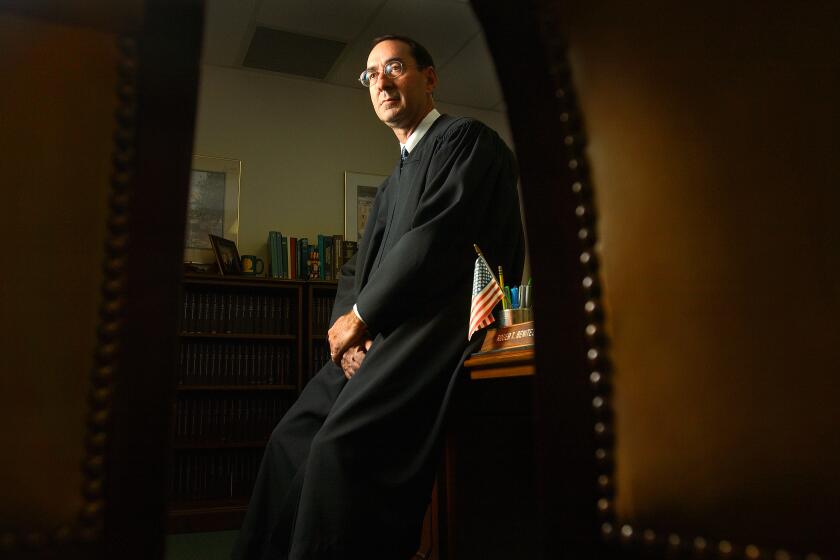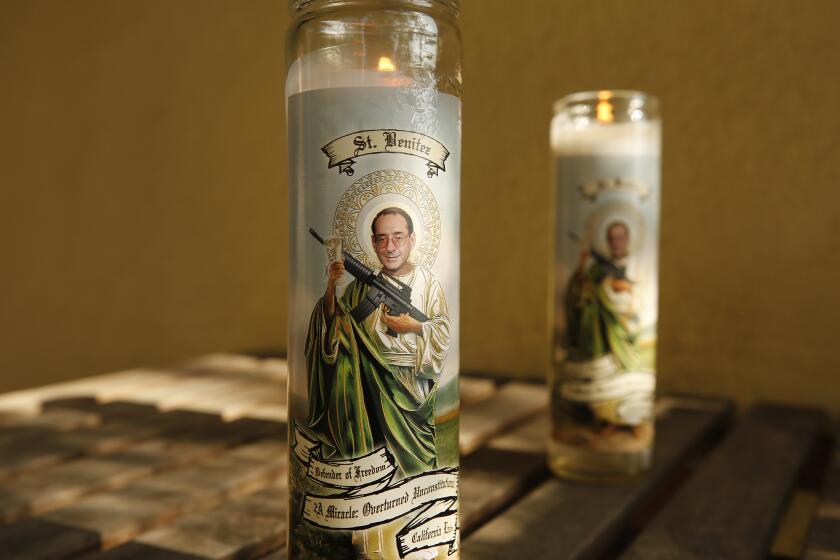Federal judge again rules California assault weapons ban unconstitutional; state to appeal

- Share via
A federal judge Thursday overturned California’s three-decade-old ban on assault weapons, finding it has no equivalent in early American history and is therefore unconstitutional.
U.S. District Judge Roger Benitez, of San Diego, found that modern semiautomatic rifles such as the AR-15 are common household items used for self-defense by millions of law-abiding citizens in the U.S. and that those citizens may not have their 2nd Amendment rights abridged by the state simply because others may misuse the same weapons in mass shootings and other deadly violence.
“Guns and ammunition in the hands of criminals, tyrants and terrorists are dangerous; guns in the hands of law-abiding responsible citizens are necessary,” Benitez wrote. “To give full life to the core right of self-defense, every law-abiding responsible individual citizen has a constitutionally protected right to keep and bear firearms commonly owned and kept for lawful purposes.”
In an era of fierce polarization, Judge Roger T. Benitez seems a perfect fit, an object of rage and adoration. His likeness as ‘St. Benitez’ — with robes and a halo, sometimes holding an AR-15 or a box of bullets — is plastered on T-shirts, prayer candles and even gun magazines.
The decision was expected from Benitez, who had previously struck down the law in a 2021 decision in which he famously compared the AR-15 to common knives — an analogy he took up again Thursday.
“Like the Bowie Knife which was commonly carried by citizens and soldiers in the 1800s,” Benitez’s latest decision begins, “‘assault weapons’ are dangerous, but useful.”
Benitez’s decision would overturn several state statutes related to such weapons, but it does not take effect immediately. As part of his decision, Benitez gave the state 10 days to seek a stay on the ruling as part of an appeal to the U.S. 9th Circuit Court of Appeals.
California Atty. Gen. Rob Bonta’s office, which has been defending the law in court, immediately filed a notice of appeal and stressed the state’s ban remains in effect for now.
“Weapons of war have no place on California’s streets,” Bonta said in a statement. “This has been state law in California for decades, and we will continue to fight for our authority to keep our citizens safe from firearms that cause mass casualties.”
John Dillon, an attorney for the plaintiffs who sued to overturn the law, said they were “very happy” with the decision and ready to keep fighting to preserve it.
“It seems like the court has applied the standards properly and correctly. There’s no doubt about it,” he said. “We’re glad that our plaintiffs’ rights are going to be respected.”
A federal judge for the second time overturned California’s ban on large-capacity ammunition magazines that can hold more than 10 bullets, ruling that it lacked a historical basis and is therefore unconstitutional.
The ruling is the second recent decision against California gun restrictions from Benitez. Last month, he overturned the state’s ban on large-capacity ammunition magazines on similar grounds.
Benitez’s ruling is also the latest blow to gun restrictions nationally since the U.S. Supreme Court’s monumental pro-gun rights decision last year in New York State Rifle & Pistol Assn. Inc. vs. Bruen.
In that case, the nation’s highest court rejected a long-standing pillar of 2nd Amendment law — that governments may enforce certain firearms restrictions if they have a compelling government interest in doing so. Instead, the high court said most restrictions on firearms can be legitimate only if they are deeply rooted in American history or analogous to some historical rule.
The 9th Circuit Court of Appeals had sent the case decided Thursday back down to Benitez, specifically to decide in light of the Bruen decision.
Benitez rejected all of the state’s arguments for why the ban should remain intact, writing that the state was “grasping at straws” and making “longshot” legal arguments for why there was historical precedent for such restrictions.
He dismissed as off the mark, insufficiently analogous, or less restrictive and therefore incomparable a host of historic laws put forward by the state. Those included laws prohibiting weapons such as dirks and daggers; banning particularly deadly weapons such as machine guns; barring specific uses of weapons such as guns being set as traps; banning the carrying but not the possession of certain weapons; or restricting certain classes of people, but not the population at large, from possessing certain weapons.
“Notwithstanding having significant time to do so, the State has identified no national tradition of firearm regulation so broad in its coverage or so far reaching in its effect as its extreme ‘assault weapon’ statutes,” Benitez wrote.
Benitez also wrote that Americans hear a lot about mass shootings using such weapons — such as in Uvalde, Texas; Sandy Hook, Conn.; Parkland, Fla.; Orlando, Fla., and elsewhere. But, he wrote, they don’t always hear about cases in which people used such firearms to defend themselves and their families from armed intruders who meant them harm. He went on to describe three such cases, two from Florida and one from Oklahoma, in detail.
Bonta called Benitez’s decision “dangerous and misguided” and said the Supreme Court in Bruen left room for states to maintain sensible gun laws.
Gov. Gavin Newsom, who has pitched a constitutional amendment to enshrine gun restrictions into federal law, criticized Benitez’s decision as another “love letter to the gun lobby” from a judge “hellbent on making it more dangerous for our kids to go to school, for families to go to the mall, or to attend a place of worship.”
Cody J. Wisniewski, an attorney for the plaintiff group Firearms Policy Coalition, said in a statement that Benitez appropriately recognized California’s law “flies directly in the face” of law-abiding citizens’ rights, and that his group will continue making the same point “in courtrooms in California and across the country.”
The California statutes in question currently bar people from possessing a host of guns — and from manufacturing, lending, selling or transporting them in the state — based in part on whether they have certain accouterments.
They ban centerfire rifles that are particularly short and concealable, centerfire rifles with fixed magazines capable of holding more than 10 rounds, and centerfire rifles that do not have fixed magazines but do have certain other features — such as pistol grips, folding or telescoping stocks or flash suppressors.
The statutes also ban semiautomatic pistols with added features such as threaded barrels and semiautomatic shotguns with features such as telescoping stocks and pistol grips.
The lead plaintiff in the case, James Miller, is a board member of the San Diego County Gun Owners Political Action Committee, which is also a listed plaintiff.
In the initial complaint in 2019, Miller alleged the state’s assault weapons ban unjustly precluded him from using a large-capacity magazine with his legally owned semiautomatic centerfire rifle, because doing so would reclassify the firearm as a prohibited “assault weapon” under state law.
Miller “would like to exercise his rights guaranteed by the Second Amendment to keep and bear arms, by possessing a semiautomatic, centerfire rifle, in common use for lawful purposes, but which the State considers an ‘assault weapon’ solely by virtue of its magazine capacity,” the complaint read.
Benitez on Thursday said the state’s restrictions go way too far in infringing on Miller’s and others’ 2nd Amendment rights, particularly because rifles such as the AR-15 are as “ubiquitous as Ford F-series pickup trucks.”
“The American tradition is rich and deep in protecting a citizen’s enduring right to keep and bear common arms like rifles, shotguns, and pistols. However, among the American tradition of firearm ownership, there is nothing like California’s prohibition on rifles, shotguns, and handguns based on their looks or attributes,” Benitez wrote. “Here, the ‘assault weapon’ prohibition has no historical pedigree and it is extreme.”
Whether the ban will fare any better before higher courts — including the 9th Circuit and the U.S. Supreme Court — remains to be seen.
State officials, gun rights advocates and experts on 2nd Amendment law are all waiting to see how the Supreme Court will handle the wave of gun cases being relitigated under Bruen — and how it will apply it and its history and tradition test in cases involving more dangerous weapons, and dangerous groups of people.
More to Read
Sign up for Essential California
The most important California stories and recommendations in your inbox every morning.
You may occasionally receive promotional content from the Los Angeles Times.
















